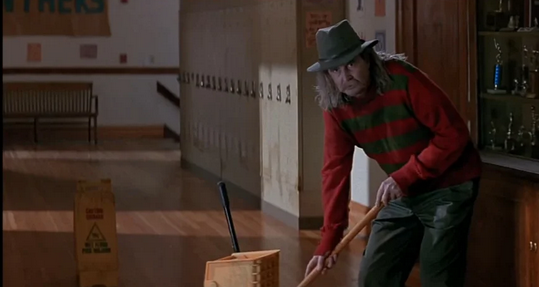Wes Craven’s characters continue. To the extent that it’s frankly a bit difficult to remember that he’s dead, when a new Scream comes out. The funny thing is that I’m not sure how happy it would have made him, if you’d told him at the beginning of his career that it was going to happen. Oh, sure, by the ‘90s if not earlier, he was used to it. But in the ‘70s, he was put into the horror ghetto very much against his will; he simply couldn’t get people to work with him after The Last House on the Left.
Back in the ‘60s, Craven was actually an English professor. I’m always curious about that sort of thing; it amazes me that we never hear from these people’s former students. Sting, for example, used to teach English at a private girls’ school, and I’ve never heard any details about his past students. Still, while Craven was teaching, he also began noodling around with a used 16mm camera. His friend Steve Chapin, brother of Harry, helped ease Craven’s way into the industry, where his first job was as a sound editor.
In fact, Craven started writing and editing by working in hardcore pornography. He was using a pseudonym for most of the work—IMDb lists one of those movies, where he was credited as Abe Snake, but there are doubtless more. He even apparently worked on Deep Throat, though his specific job on the film is still unknown. He even appeared in the documentary about it, and I guess no one asked him? Still, it paid better than being an English teacher, so he kept at it.
When he made The Last House on the Left, he expected it to go unnoticed and screen practically nowhere. He felt it gave him a freedom to explore a darker story than he might otherwise have done. However, it was screened much more widely than he’d anticipated, and it tanked his possibilities in the industry. In the ‘70s, you weren’t going to go from a low-level horror movie to a big-budget blockbuster. He wrote a series of non-horror scripts that he couldn’t get made before eventually getting the idea for The Hills Have Eyes. After that, he mostly resigned himself to his place in the industry.
To the extent that I remember the genuine shock people felt at Music of the Heart. Which I didn’t see, not because of the Wes Craven connection but because it seemed like a treacly mess. The plot just didn’t work for me. But while Craven might be a horror icon, one of the greatest horror icons of my lifetime, it is still sad that he stayed in horror because he wasn’t given a choice. Did he have ideas that would have been better than Music of the Heart that just didn’t get made? We’ll never know.
My outlet for essays and fiction that don’t quite work with Solute parameters is going to start being my Patreon, and I’d share with people who paid me on Ko-fi, too!

